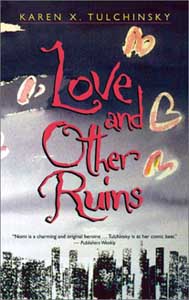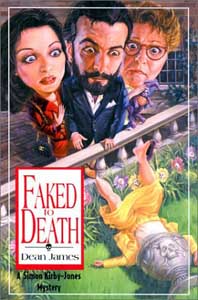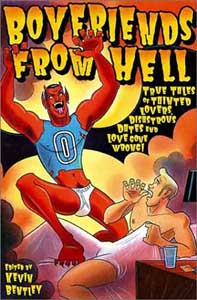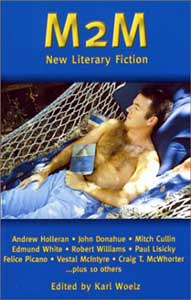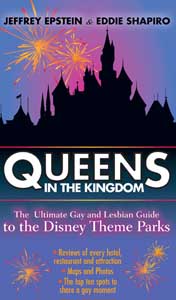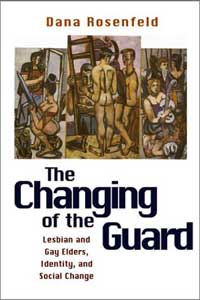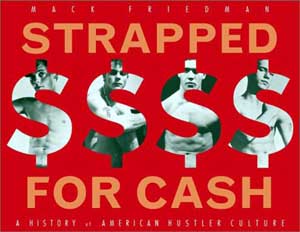-
- Bush: gays are sinners
- California bans discrimination against transgender citizens
- Mass. court could make history with gay marriage ruling
- National HIV prevention conference ends on sour note
- Openly gay bishop-elect cleared of misconduct allegations
- NYC defends gay high school despite threat of lawsuit
- National News Briefs
- World News Briefs
feature
Summer Reading
Books for the beach, the bedside table and beyond
Published Thursday, 07-Aug-2003 in issue 815
With plenty of toasty summer days left ahead and another Pride season behind us, it’s time to hit the beach with some good books for your edification, enlightenment or just plain entertainment. The following is a list of some great books we recommend you plop in your book bag and peruse while absorbing the sun’s deadlier-by-the-day UV rays and listening to the waves gently break. Now that you’ve gotten yourself in tip-top shape for summer, it’s time to exercise your mind as well, lest you succumb to the early onset of Alzheimer’s disease (these things happen; don’t say we didn’t warn you).
In her memoir, She’s Not There: A Life in Two Genders, author Jennifer Finney Boylan (formerly James Finney Boylan) may potentially undo much of the damage done to transsexuals by works such as Silence of the Lambs — dispelling many commonly held myths about transsexuals with wit and an engaging narrative style.
For over 40 years, Jennifer Boylan lived as a man. A respected chair of literature at Colby College in Waterville, Maine, Boylan produced several acclaimed novels, married a woman and fathered two children — all while dealing with the knowledge that she was in fact a woman. Though Boylan appeared to be living a charmed life, her inner struggle only escalated over the years.
Four years ago, recognizing that she could no longer go on as she had, James Boylan set out on a transition to become female, emerging as Jennifer Finney Boylan.
Tall and willowy, with shoulder-length blond hair, the 45-year-old Boylan said she would have preferred to soldier on in silence as a man, sparing herself and her loved ones much sadness and pain. But she maintains that she had no choice but to accept her transexuality and deal with it.
As author of three comic novels, including The Planets and Getting In, Boylan realized early on that she was in the midst of a remarkable story that straddled the seam between humor and tragedy as it detailed her metamorphosis to womanhood.
Boylan changed the names of many of the people in her book, including “Grace,” the then-wife and now-partner whose love and support have been unflinching throughout. Their evolving relationship, now sexless, is a work in progress.
“There’s not a good word for what we are. We’re certainly not husband and wife. We’re not a lesbian couple. We are co-parents, we’re friends, and we are lovers in many senses of that word,” she said. “We’re two pretty average people thrown into remarkable circumstances and we’re just making it up as we go along, trying to do the best we can.”
Boylan acknowledges that she is now attracted to men — her surgeon changed the electricity as well as the plumbing. But Boylan said she and Grace remain married under the law and neither has explored other relationships, although there is no telling what the future may hold.
She’s Not There contains an afterword by Boylan’s best friend, Pulitzer Prize-winning novelist Richard Russo, who taught at Colby and shared an office with her. Russo, who figures prominently in the memoir, initially had a hard time dealing with Boylan’s transsexuality but quickly came around and later accompanied his friend and Grace to Wisconsin for the surgery. The enduring friendship of the two novelists and Russo’s ability to transcend and accept Boylan’s transition with poise and grace makes for one of the book’s most endearing qualities.
— Associated Press
Best known for her award-winning science fiction, in her new novel, Stay, author Nicola Griffith delves into the private eye genre for a look at the shadow side of human nature. Stay is the second in a series, continuing the story of Aud (rhymes with shroud) Torvingen, a hero with a decidedly dark side. A tall, beautiful, glacial private investigator/bodyguard, Aud can do absolutely anything — except have an actual relationship with another human being. It doesn’t help that her most successful attempt ended with her lover dying in her arms due to a fatal mistake on Aud’s part.
Stay opens with Aud hiding away from the world and everyone in it, building a cabin in the splendid isolation of the Appalachians. She is dragged out of her bubble when an old friend arrives unannounced, pleading with her to find his missing fiancée. She takes the case, more to make him leave her alone than out of any burning desire to help, and discovers that even the thoroughly disillusioned can be shocked by human behavior.
Stay offers a complex, fascinating protagonist, an engaging storyline and a glimpse into the uglier depths of human motivation.
— Amber L. Cyphers
It is possible that author Dean James had to have his tongue surgically removed from his cheek after writing Faked to Death. The hero of this tale is Simon Kirby-Jones, a southern born and bred American who lives in the English village of Snupperton Mumsley, making a very nice living as a respected author. It all sounds like every other lightweight mystery series, except that Kirby-Jones happens to be a gay vampire with a delicious male executive assistant panting after him. He also happens to write, not only historical novels as Daphne Depwood, but a series of best-selling detective stories as Dorinda Darlington, a “famously reclusive woman” whose true identity is known only to her agent.
Trouble starts when Kirby-Jones appears at a writers’ convention as himself and a strange woman shows up as Dorinda Darlington. To make matters worse, his agent publicly supports the woman’s claims. When the faux Dorinda Darlington turns up dead, all eyes are on Kirby-Jones, who must solve the mystery with the help of his ever-devoted assistant.
Faked to Death is a spoof of every little English lady detective story and “Murder She Wrote” episode ever written. It’s not exactly Homer, but it’s perfect junk food for those beach days.
— Amber L. Cyphers
Love and Other Ruins is the sequel to Karen X. Tulchinsky’s successful novel, Love Ruins Everything. The story is basically a year in the life of Nomi Rabinovitch and her cousin Henry. Nomi is picking up the pieces in San Francisco after her girlfriend dumps her, while Henry is in Toronto, deeply involved with AIDS activism and his doting boyfriend, even as his own health begins to slide dangerously.
It’s a simple concept, but from Henry’s Jewish mobster dad, whose visit with Henry and his lover turns into a semi-permanent and semi-maddening living arrangement, to Nomi’s new lipstick lesbian love and guilt-inducing mother, the characters are fully fleshed and real, drawing the reader in to find out what they will do next.
Love and Other Ruins is funny, touching and entirely believable, well worth a read.
— Amber L. Cyphers
Looking for some light summer reading? Look no farther than Escort Tales by Joseph Ltiel. A collection of short stories, Tales is perfect for some mindless poolside or beachside scanning — and it’s got enough steamy sex to make Daniel Steele either blush or start taking notes for her next novel. The stories are set around the world — from Manila and Jerusalem to Acapulco. If you’ve ever wondered about the glamorous and not-so-glamorous life of male escorts, this book might just do the trick, as it were.
The highlight is the story of Dominic, an underage hustler in the resort town of Acapulco, who is taken in by a wealthy older gentleman from San Francisco as his trophy boy. There is also a look at a day in the life of Thor (a.k.a. David, a.k.a. Dwight), a blond Adonis who would have made it big in the porn industry if only it hadn’t been for his undersized equipment. He makes a living as a high-priced escort in West Hollywood instead. Don’t bother with Escort Tales if you’re looking for deep, meaningful reflections about life as seen through the eyes of men who work in the sex industry. But if you want a good laugh (whether intended or not) this book is a fun read that will make you want to read the good parts out loud to all of your friends.
— Travis D. Bone
All of the 20- to 30-year-olds out there who frequented elementary school book fairs in the ’80s will recognize the cover design of Escape From Fire Island. The book is designed to look almost exactly like the classic “Choose Your Own Adventure” books that many Gen-Xers grew up reading — only this one is twice as fun.
Complete with a bitchy best friend who spends an hour of what is supposed to be a dream vacation at WalMart looking for a new hair dryer because he left his lucky one at home, Escape from Fire Island! features hunky life guards, drag queens who have been turned into flesh-eating zombies, a romp through the woods and a circuit party where one industrious partier has learned that if you mix Special K, Viagra and a Flintstones chewable vitamin you get a zombie antidote. This quick read gives you options every few pages that let you determine your own story. It can be read over and over again with 29 possible outcomes.
One final tip — ditch your friend Jose. His repeated sex romps will only slow you down when you’re being chased by a Cher impersonator with razor sharp press-on nails.
— Travis D. Bone
$23.95 hardcover.
For Manhattan’s cultural insiders, pretenders and hangers-on, this episodic novel’s depiction of excess and ennui should vibrate with cheeky resonance. It’s a pity, then, that most of those people probably won’t read Do Everything in the Dark — except perhaps to see if Indiana’s wicked way with character assassination includes them. Or to cluck over his incisive dissection of self-centered personalities, among them a Susan Sontag-like intellectual. As for the rest of us — well, there’s a perverse and powerful charm to this aggressively melancholic account of a social set’s inexorable slide into decay. The author’s jump-cut take on the short-circuited potential and damaged psyches of the actors, writers, and other artists drawn from his world is both catty and compassionate, a tricky balancing act. But he pulls it off with sharp-witted style,
excavating his past as art critic for The Village Voice to skewer that world’s artifice with gusto. Indiana’s previous work, most recently the novels Depraved Indifference and Three Month Fever, have all been edgy chronicles of folly. This one extends an idiosyncratic winning streak.
— Richard Labonte
Jo leaves Mark because she loves Gail. But after the marital manse, her new home feels cramped. Worse, Gail’s pouty daughter, Connie, is disgusted by lesbians and resents Jo’s presence. Jo meets veterinarian Laura and starts an affair. Gail becomes pouty. Jo moves into a swank condo sublet. Connie suddenly misses Jo. Meanwhile, the father who disappeared when Jo was 3 years old suddenly surfaces — he’s a gay bookseller. And Laura decides to move away to co-own her own pet clinic. So: will Jo relocate with Laura? Will Jo get over her anger at her father? Does Connie’s new friendship with gay boy James signify new tolerance for Jo? Most importantly — will Jo realize Laura was merely a fling and reconcile with Gail? No, yes, yes, and of course, yes. There is no narrative tension to this etch-a-sketch novel. Calhoun’s stolid lesbian romance is utterly, comfortingly predictable: no crisis too searing, every trauma resolved with the turn of a page or two. Bonus cliches: Outside the Flock contains scenes of a teen girl falling in love — with horses. And a cat.
— Richard Labonte
$16.95 paper.
This excellent anthology of short gay fiction is a noble literary dinosaur. In years past, the Men on Men series, launched by George Stambolian, was just the leader of a pack of such anthologies. But the field has become glutted with erotic collections — some with literary flair, but most variations on fetish themes of butts and muscle, rough sex and bear sex, and so on. So bravo to AttaGirl for M2M, a solid anthology of 20 stellar stories. Editor Woelz salts it with fine new work from marquee veterans: Felice Picano, Andrew Holleran, Edmund White. But the exciting literary fizz is in newer work, particularly J.E. Robinson’s tense “Gorgon,” about a private school teacher and the students who bewitch him; Rakesh Satyal’s dreamy “Skins,” about a sissy soccer player’s lust; Craig T. McWhorter’s rueful “All There Is,” about jealousy and forgiveness; and Vestal McIntyre’s quirky “Disability,” about unexpected love. Woelz was co-editor of Men on Men 2000, the last in the acclaimed eight-book series, with David Bergman. His M2M is a distinguished descendant.
— Richard Labonte
Though there have been a number of books distilling the lives of queer elders, they’ve generally been more anecdotal than analytical. The Changing of the Guard is both — sophisticated theory enlivened with vivid personalities. Rosenfeld ably weaves the candid reflections of 35 lesbians and gay men through her academic meditation on the complexities of same-sex desire, self-awareness and self-acceptance. The result is an occasionally poignant study of elderly homosexuals — none identify themselves as “queer,” and some don’t even use the word “gay” — living as seniors in a world more tolerant than when they were growing up and, to lesser and greater extents, coming out. Those interviewed range from 64 to 89; their life experiences range from furtive and circumscribed to — not often — defiant and proud. One startling finding: though for many gays under 50 Stonewall signifies a definite pre- and post-liberation marker, most of Rosenfeld’s subjects reported that the 1969 Greenwich Village riot had scant impact on their lives. A few had never heard of it — one jarring fact from this insightful analysis.
— Richard Labonte
paper.
Boyfriends from Hell is not a book for beginners. Only the brave — or the desperate — will dare date after reading these remembrances of love gone awry.
Editor Bentley’s treasure trove of romantic tragedy is sublime cautionary hyperbole (that is, factual exaggeration not intended to deceive — and these 19 pieces are too good not to be true). Because they’re drawn from rejection,
misunderstanding and disaffection, these confessional revelations ooze with rueful wit. Two of the best are Jim Coughenour’s “Happy Birthday,” about first love as a harrowing form of gay boot camp; and Simon Sheppard’s “Going Down, Going Down Down,” about a tryst with a tweaking twinkie. Most accounts are hilarious — Jerry Rosco’s “My Boyfriend Brought Home a Rock Band,” about the Butthole Surfers, is a standout. There are serious essays, too — Asian-Canadian Andy Quan’s “Rufo,” about ethnic eroticization, and Marshall Moore’s ode to dysfunctional dating, “Almost.” And then there’s the angry ex who tried to chew off his former beau’s scrotum — eek! Who needs a date tonight? Stay home with a good book. This one.
— Richard Labonte
This fierce, somewhat bloodthirsty police procedural is the second in a series. Caution one: read Bleeding Out (Firebrand, 2000), in which Clare introduced hardboiled homicide lieutenant L. A. Franco, before starting Street Rules. Otherwise, the complicated personal tics and romantic foibles of the
tough-talking, tender-hearted cop won’t make much sense. Caution two: This is no bloodless cat-solves-the-crime caper or even an authentically gritty Kate Delafield mystery from Katherine V. Forrest. Lt. “Frank” Franco, lesbian head of a
rowdy crew of male detectives, lives and works in a Los Angeles barrio awash with graphic crime scenes, unrelenting chauvinism, and intricate backstabbing and betrayal. Street Rules is an intense, sometimes unsettling read, heavy on blood and sorrow. Clare captures the street-level realities of gang lives, drive-by-death, forced prostitution and grinding poverty with the chilling power of someone who has been there — or at least researched it well. Caution three: The book is rife with unfortunate typos, to the point of annoyance. Let’s hope for better proofreading and more backgrounding in book three.
— Richard Labonte
Strapped for Cash is a book of several fascinating parts. It’s a comprehensive social and sexual history of male prostitution in America since 1600 — everything from 18th-century sailor boys and their Manhattan Island “fairies,” to the Internet escorts of the 21st century. It also expresses heartfelt concern for the health and welfare of contemporary male sex workers; offers pages of sultry come-on photos culled from varied eras of gay pictorial/hustler porn; and is sprinkled with snippets of defiant, sassy, often wrenching oral histories from more than 50 male and transgender hookers. Friedman turned tricks for a spell in his college years — even toiled as a nude housecleaner in apartments that weren’t always dusty — and now works as a case manager for youth prostitutes. This well-rounded perspective adds sincere heft to his meshing of objective scholarship and subjective advocacy. Alyson has given the book an arty coffee-table design, a handsome format that showcases the photos and other
illustrations but invites casual browsing rather than serious reading of the solid,
informative text.
— Richard Labonte
The real world terrifies, mortifies and mystifies Danny Burke. The athletic boys at his Long Island Catholic school bully him. The banality of his home life embarrasses him. Fantasies inspired by images of Jesus bleeding on the cross confuse (and arouse) him. He’s the epitome of a sissy — and he’s only 11, a precocious preteen whose nascent homoerotic misery is depicted with melancholy hilarity in House’s canny novel for grown-ups. To avoid the horror of recess dodge ball games, young Danny convinces his teacher to let him pen an Easter play based on the Gospels — “The Passion of Christ,” emphasis on the passion. The unfortunate cast consists of fifth-grade misfits, including a narrator who lisps (“Now began the darketh hourth of Jethuth’th thuffering...”) and Danny as Jesus, so into his role he drags his wooden cross to school on the morning of the ill-fated production. (“Take the back roads,” his long-suffering mother pleads.) The Beginning of Calamities, an auspicious debut, is a jaunty reminder of the cruelty of childhood and a good-natured dissection of religious hysteria.
— Richard Labonte
Let’s see — in the first few chapters, Max Frankel is sneered at as an elitist New York Times columnist, a post he hasn’t occupied for several years, and Time Out New York is slammed as a “gay rag,” which it most certainly is not. Like many self-righteous writers from the right — Ann Coulter, toss those
long blond locks proudly! — the author of The Death of Right and Wrong isn’t much bothered by facts when she goes on the attack. In this often incandescently incoherent cut-and-paste effort, the self-defined “pro-choice, pro-death
penalty, pro-gun, lesbian feminist” targets the “malignant narcissism” of a hodgepodge of black, media, entertainment, feminist, and left “Elites,” blaming them for, well, everything she doesn’t like. (The radical Gay Elite is eviscerated — or, possibly, flagellated — in the chapter “First the Culture, Then the
Children,” for promoting pedophilia by backing sex-ed instruction in the classroom. We’re so sly.) So, then, why might a middle-of-the-road queer care to read Bruce’s fiery screed? It’s a know-the-enemy, confront-the-stupidity, recoil-at-the-intolerance kind of thing. Just wash your hands afterward.
— Richard Labonte
Elizabeth Sims’ Holy Hell, the first Lillian Byrd crime story, was a
muddle. The author’s amateur sleuth was an unconvincing newspaper reporter, forever thinking illogically and acting improbably. Damn Straight, a second novel better than the first in almost every way, gets it right — sharper writing and a
complex plot that’s both over-the-top and inherently coherent. The setting is the lesbian-centric Dinah Shore golf weekend in Palm Springs, where Byrd has flown from wintry Detroit to give her oldest straight friend advice on how to
bed a woman — an amusing secondary plot. The primary story line has Byrd falling instantly in love with the star of the LPGA tour, and then gradually uncovering her horrifying past. So much for true love. It’s usually best to start with the first book in a series — but if you haven’t read Holy Hell, don’t
rush. The only quality the books have in common is Byrd, a spunky lesbian who plays a mandolin for relaxation, keeps a bunny for a pet, and this time is in a novel worthy of her quirky talents.
— Richard Labonte
Dry, Augusten Burroughs’ new memoir, is the follow up to his first bestseller, Running with Scissors. Unlike the movie sequel that bears the inevitable comparison to its predecessor, Dry stands on its own while continuing the engaging story of Burroughs’ life. Whereas Scissors dealt with harrowing content and was populated by a cast of crazy characters, it didn’t delve into the emotional scars that often accompany such a chaotic life. Dry is rich with emotional textures, as Burroughs’ story picks up years after the events in Scissors.
Dry is the story of his struggles with alcoholism and his subsequent need to re-shift his priorities in life. Whether that is spending more time with his friend, Pighead, who is living with AIDS, not showing up for work smelling of alcohol from the last night’s bender, or falling for the wrong guy, Burroughs tackles the subject at hand with deftness and humor, and makes the book completely accessible to gay and straight readers alike.
— Tim Parks
|
|
Copyright © 2003-2025 Uptown Publications

